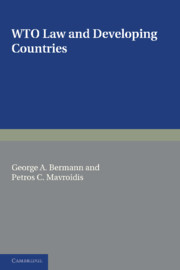Book contents
- Frontmatter
- Contents
- Contributors
- Developing Countries in the WTO System
- 1 The Legal Status of Special and Differential Treatment Provisions under the WTO Agreements
- 2 Trade Preferences to Small Developing Countries and the Welfare Costs of Lost Multilateral Liberalization
- 3 China in the WTO 2006: “Law and Its Limitations” in the Context of TRIPS
- 4 Developing Countries in the WTO Services Negotiations: Doing Enough?
- 5 Developing Countries and the Protection of Intellectual Property Rights: Current Issues in the WTO
- 6 Participation of Developing Countries in the WTO – New Evidence Based on the 2003 Official Records
- 7 Developing Countries and GATT/WTO Dispute Settlement
- 8 Representing Developing Countries in WTO Dispute Settlement Proceedings
- 9 Compensation and Retaliation: A Developing Country's Perspective
- 10 A Preference for Development: The Law and Economics of GSP
- 11 The GSP Fallacy: A Critique of the Appellate Body's Ruling in the GSP Case on Legal, Economic, and Political/Systemic Grounds
- 12 Is the WTO Doing Enough for Developing Countries?
- Index
12 - Is the WTO Doing Enough for Developing Countries?
Published online by Cambridge University Press: 04 August 2010
- Frontmatter
- Contents
- Contributors
- Developing Countries in the WTO System
- 1 The Legal Status of Special and Differential Treatment Provisions under the WTO Agreements
- 2 Trade Preferences to Small Developing Countries and the Welfare Costs of Lost Multilateral Liberalization
- 3 China in the WTO 2006: “Law and Its Limitations” in the Context of TRIPS
- 4 Developing Countries in the WTO Services Negotiations: Doing Enough?
- 5 Developing Countries and the Protection of Intellectual Property Rights: Current Issues in the WTO
- 6 Participation of Developing Countries in the WTO – New Evidence Based on the 2003 Official Records
- 7 Developing Countries and GATT/WTO Dispute Settlement
- 8 Representing Developing Countries in WTO Dispute Settlement Proceedings
- 9 Compensation and Retaliation: A Developing Country's Perspective
- 10 A Preference for Development: The Law and Economics of GSP
- 11 The GSP Fallacy: A Critique of the Appellate Body's Ruling in the GSP Case on Legal, Economic, and Political/Systemic Grounds
- 12 Is the WTO Doing Enough for Developing Countries?
- Index
Summary
Introduction
In a fundamental sense, the answer to the question in the title of this paper is doubtless negative. But an adequate analysis of why this is so and what might be done about it is impossible without asking another question: are developing countries doing enough for themselves in the WTO? The assigned title of the paper implicitly assumes that the contribution of the WTO to developing countries – whether negative or positive – is in the hands of others. The additional question posed here presupposes that developing countries can also influence the contribution that the WTO makes to their growth and development. Both questions inform the analysis in this paper.
Some commentators and writers on developing country issues in the WTO tend toward the misleading assumption that developing countries can be treated as a homogeneous group. It has become increasingly obvious that important differences in interests and priorities exist among developing country WTO Members. This maybe less true for the least-developed country (LDC) group, identified on the basis of a series of economic and social indicators by the United Nations. But even among LDCs, priorities are not always the same. Some have suggested that emphasizing differences among developing countries is a modern variant of a divide-and-rule strategy. But in reality developing countries are very different in fundamental ways, which is bound to be reflected in their priorities and interests. Developed countries will not agree to uniform policy treatment for all developing countries in the system, and many developing countries have the same reservations.
- Type
- Chapter
- Information
- WTO Law and Developing Countries , pp. 324 - 362Publisher: Cambridge University PressPrint publication year: 2007
- 3
- Cited by



